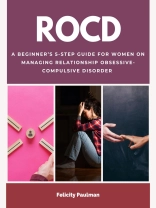Are you constantly plagued by doubts and uncertainties in your romantic relationships? Do you find yourself questioning whether you’re truly in love or if your partner is ‘the one’? If so, you might be experiencing Relationship Obsessive-Compulsive Disorder (ROCD), a condition that affects countless women around the world.
Love is a beautiful and complex emotion, but for those with ROCD, it can become a source of immense distress and anxiety. This comprehensive guide aims to shed light on the unique challenges faced by women battling ROCD and provide a roadmap for navigating through the turmoil. Whether you’re currently in a relationship, single and searching, or have experienced ROCD in the past, this guide will equip you with the knowledge and tools necessary to regain control of your emotional well-being.
Imagine a life where you no longer question the authenticity of your feelings or doubt the strength of your relationship. By understanding the intricacies of ROCD, you will gain invaluable insights into the underlying factors that contribute to this disorder. Armed with practical strategies and techniques, you’ll be empowered to confront your fears head-on and cultivate healthier, more fulfilling relationships.
In this Guide, We will talk about the following:
- What is Relationship Obsessive-Compulsive Disorder (ROCD)?
- Causes, Symptoms, and Treatments of ROCD
- Lifestyle Changes to Manage ROCD
- What is Cognitive Behavioral Therapy (CBT)?
- Principles of Cognitive Behavioral Therapy (CBT) to ROCD
- Benefits and Disadvantages of Cognitive Behavioral Therapy (CBT) to ROCD
- Potential Side Effects of Cognitive Behavioral Therapy (CBT)
- 5-Step Guide to Getting Started With Cognitive Behavioral Therapy (CBT)
- What to Expect During The Therapy Session
Throughout this guide, various strategies will be discussed, including cognitive-behavioral techniques, mindfulness practices, and self-care recommendations specifically tailored to women. By following these practical steps, readers will gain insight into their thought patterns, challenge negative beliefs, and develop healthier coping mechanisms to alleviate the distress caused by ROCD.
Table of Content
Introduction
What Is ROCD in Women?
What Is Cognitive Behavioral Therapy?
A 5-Step Guide to Manage ROCD
A Five-Step Self-Starter Guide to Managing Relationship Obsessive Compulsive Disorder (ROCD)
Conclusion
FAQs
Resources and Helpful Links












